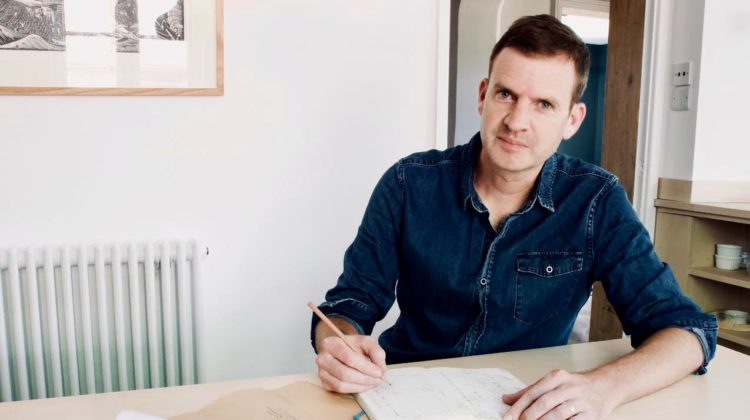
Andrew Whittaker is the founder of Hyrst Furniture, a Suffolk-based social enterprise which works with prisoners at nearby HMP Warren Hill to make low-impact, design-conscious furniture and homewares. Here, he explains why it was important to build a business that was both good for people and the planet
When did you first have the idea for Hyrst Furniture and what were you all doing before?
Hyrst has been around three years in the making. My background lies in media and design, in particular furniture design. A previous furniture enterprise that made use of reclaimed materials provided the spark for Hyrst, and got me thinking about how to build a business that could make design-led ‘new stuff’ whilst also taking a nature-first approach.
What is the meaning behind the name?
Hyrst is an old English word for a wooded copse. Most of the products we create at Hyrst are made in wood, often sourced from English woodlands, so that name fitted well. We also wanted a name that resonates with where we live and work, here on the Suffolk coast – that connects with the Anglo-Saxon history bubbling away just under the surface. Something that King Raedwald might have approved of!
Is it important to you to have created something that has a double whammy of being both good for people AND the planet?
To answer the second half that question first: yes! It’s incredibly important to us that the business has a positive impact on our local community as well as being low-impact in environmental terms.

The concept for the business sounds pretty simple, really. To make low-impact and beautiful furniture and homewares using the resources on our doorstep. However, there are several challenges to making this work as a viable, scalable business.
Britain is blessed with expert and original designer-makers. Craftspeople and specialists in small workshops, often working alone to produce beautiful, bespoke furniture and homewares. They prize traceability and quality. They tread lightly. Just like we do. We love them. We want them to live long and prosper. But we also want this sustainable, ecologically sound mode of production to be accessible to a wide audience. We want to offer a competitively priced alternative to the manufacturers and retailers who ship materials and products around the world, who use anonymous labour, and make items with a limited lifespan. To be small in spirit but thinking big.

We’re doing this by working both with small, independent makers and the workshop at HMP Warren Hill. Our relationship with HMP Warren Hill forms a key part of our ambition. It’s a category C men’s prison, based less than a mile from our studio. The large workshop at Warren Hill manufactures furniture for the prison network around the UK. The prisoners are paid for their work, and the skills learned contribute to their rehabilitation ahead of release. It’s a sizeable resource in the heart of our local community. By working with the prison, and paying them the commercial market rate for their work, we can keep the footprint of our business really small whilst still producing at scale. So, there are benefits for Hyrst and there are also significant benefits for Warren Hill and its residents.
When did you launch and how has the pandemic affected the way you all work?
We launched towards the end of 2019, not long before the pandemic hit. Having worked hard to set up the relationship with Warren Hill, it was frustrating for all concerned that we had to press pause for several months when Covid hit. But we came through it, and things are working well now.
Who else is involved?
I design and prototype the furniture and homewares, and then work with our hugely talented furniture maker, Ben, and the instructors and inmates at Warren Hill to manufacture and finish the products. Wherever possible, we use other Suffolk or Norfolk based independents to help with other elements of the business, such as photography and marketing.

Where do you source your raw materials? It’s important that it’s very much a Suffolk-made concern?
As mentioned, we work primarily in wood, and we always try to source timber that has been grown and processed as close to home as possible. For example, we recently bought a large quantity of beautiful ash timber from the Suffolk Wildlife Trust; this timber had been cut and milled at Bradfield Woods, as part of the Trust’s careful management of the site. Ideally, we would only use timber supplied from Suffolk. However, it’s not always possible to source so locally, particularly at scale; the market remains dominated by imports from overseas. By increasing awareness and demand for British-grown timber, we’re hopeful that it will become a more viable option for UK manufacturers in the future.
What has the feedback been from the inmates so far?
The feedback from inmates and instructors at Warren Hill has been very positive. The introduction of new designs and processes by Hyrst gives prisoners the chance to learn new skills and acquire Woodwise qualifications. Similarly, the feedback from the wider community in coastal Suffolk has been really encouraging; people have responded to the collaboration in a really positive way.

Where can you go from here with Hyrst Furniture, do you think?
The ambition in the short term is to grow the range of products that we’re making in collaboration with Warren Hill and with skilled local makers. Beyond that, we’d love to push the messaging and ethos out beyond furniture and homewares. To show that working with locally sourced materials and labour – making things to last, and making them in an ethical way, with a nature-first approach – can transpose to the mass market. To show that this model can become the new normal. Easy, right?
Visit hyrst.co.uk









Leave a Reply